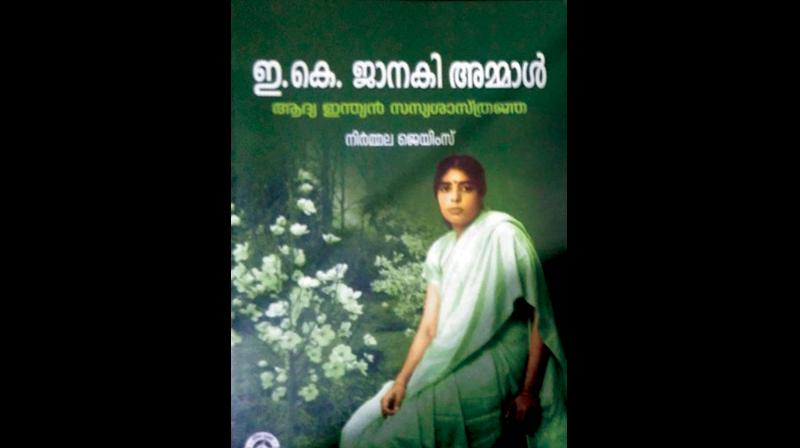Life and work of Janaki Ammal immortalised

Thiruvananthapuram: India's first woman botanist E.K. Janaki Ammal (1897-1984) has been immortalised in a book brought out by the Bhasha Institute.
Janaki Ammal's first biography written by retired school teacher Nirmala James of Kadakkal, Kollam, portrays her life and work that led to great advancements in botany and cytogenetics.
She was awarded Padma Shri in 1977 and the Ministry of Environment and Forestry instituted the National Award of Taxonomy in her name in 2000. She was elected Fellow of the Indian Academy of Sciences in 1935 and the Indian National Science Academy in 1957. The University of Michigan which conferred an honorary LL.D. on her in 1956 said: "Blest with the ability to make painstaking and accurate observations, she and her patient endeavours stand as a model for serious and dedicated scientific workers."
Recently, two Indian plant breeders, Girija and Viru Viraraghavan, who bred a new rose, named it 'E.K. Janaki Ammal as a tribute to her contribution to plant science. A Magnolia flower was earlier named Magnolia Kobus Janaki Ammal.
She was responsible for restructuring the Botanical Survey of India in Calcutta in 1951 at the behest of the then Prime Minister Jawaharlal Nehru. Janaki is also the co-author of 'Chromosome Atlas of All Cultivated Plants,' the bible of plant scientists.
Janaki Ammal Edavalath Kakkat was born at Thalassery on November 4, 1897. Though girls' education was restricted to fine arts then, she chose to study botany. After her schooling in Thalassery, she obtained her bachelor's degree from Queen Mary's College in Madras and an honours degree in botany from Presidency College in 1921.
Janaki worked at the John Innes Horticultural Institute, England, from 1940 to 45, where she faced prejudice and obstruction for being an Indian. However, she achieved brilliant successes in her fields, especially in sugarcane and aubergine.
She was also an expert in cytogenetics, the study of genetic content and expression of genes in the cell.
While in England, Janaki conducted research in chromosome numbers and various garden plants.
Her work led to breakthroughs in the understanding of evolution of species and varieties.
Janaki, who remained a spinster, obtained a Ph.D from the University of Michigan in 1931.
Incidentally, she worked for a brief period in her home state. She was professor of botany at the Maharaja's College of Science, Thiruvananthapuram, and the present University College, and taught there from 1932 to 1934.

